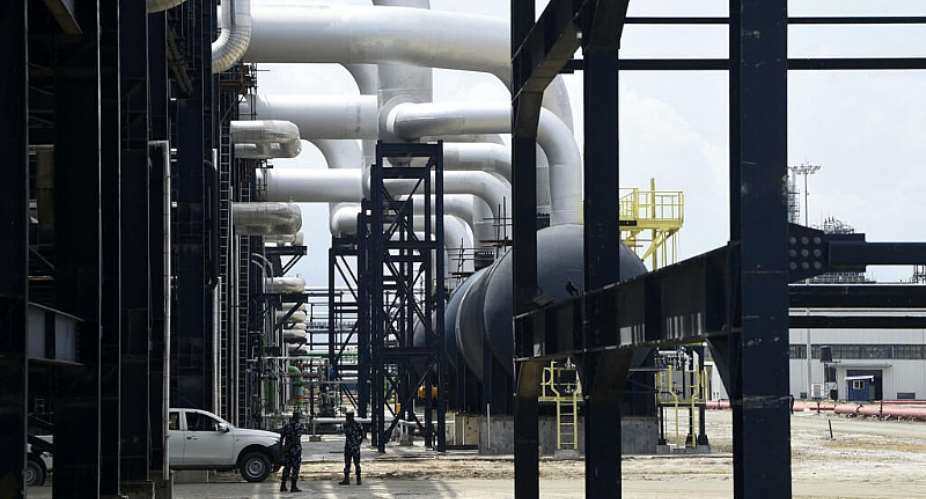Nigeria's long-awaited Dangote refinery has begun producing diesel and aviation fuel, the company said on Saturday, after years of delays. The plant, the largest of its kind in Africa, is expected to supply not only Nigeria but other countries in West Africa – potentially transforming the region's oil trade.
Announcing the start of operations, the conglomerate behind the refinery called it "a big day for Nigeria".
"We are delighted to have reached this significant milestone," the Dangote Group wrote on social media platform X.
The vast plant, built on the outskirts of Lagos for an estimated cost of €19 billion, is funded by Nigerian business tycoon Aliko Dangote – said to be the richest person in Africa.
The plant is expected to begin with test runs to check that its various units function correctly.
It can take several more months before a new refinery is ready to produce high-quality fuels at full capacity. Dangote has said it will start by refining 350,000 barrels per day, hoping to ramp up to full production later this year.
Game changer
Once fully operational, the 650,000 barrel-per-day refinery could be a game changer by helping end Nigeria's reliance on imported petroleum products.
Although Nigeria is Africa's top energy producer, it lacks refining capacity and depends on imports for most of the fuel it consumes.
The new refinery is expected to not only make it self-sufficient but also allow it to export to neighbouring West African countries.
That would represent an unprecedented challenge to the European and US energy giants that have long supplied Africa's fuel.
- France's TotalEnergies to invest billions in Nigeria
- Africa's oil producers eye energy independence after Covid-19
First announced in 2013, the Dangote refinery was originally slated to begin production in 2016.
After years of construction delays and mounting costs, the plant was officially inaugurated in May last year – but couldn't start refining because it didn't have enough crude oil.
It received its first shipment of crude in December, followed by five others. The latest delivery, another million barrels that arrived on Monday, brings its total supply to 6 million barrels.
(with newswires)





 We saved $57.9million from procurement of new verification devices, registration...
We saved $57.9million from procurement of new verification devices, registration...
 Ejisu by-election: Aduomi is a betrayer – Ahiagbah
Ejisu by-election: Aduomi is a betrayer – Ahiagbah
 Dumsor: I’ll be in police custody if I speak, I vex — DKB
Dumsor: I’ll be in police custody if I speak, I vex — DKB
 We'll give daily evidence of Akufo-Addo's supervised thievery from our next gene...
We'll give daily evidence of Akufo-Addo's supervised thievery from our next gene...
 Asiedu Nketia crying because they've shared the positions and left him and his p...
Asiedu Nketia crying because they've shared the positions and left him and his p...
 Mahama's agenda in his next 4-year term will be 'loot and share' — Koku Anyidoho
Mahama's agenda in his next 4-year term will be 'loot and share' — Koku Anyidoho
 If you're president and you can't take care of your wife then you're not worth y...
If you're president and you can't take care of your wife then you're not worth y...
 Foreign Ministry caution Ghanaians against traveling to Northern Mali
Foreign Ministry caution Ghanaians against traveling to Northern Mali
 GHS warns public against misuse of naphthalene balls, it causes newborn jaundice
GHS warns public against misuse of naphthalene balls, it causes newborn jaundice
 Our education style contributes to unemployment - High Skies College President
Our education style contributes to unemployment - High Skies College President
